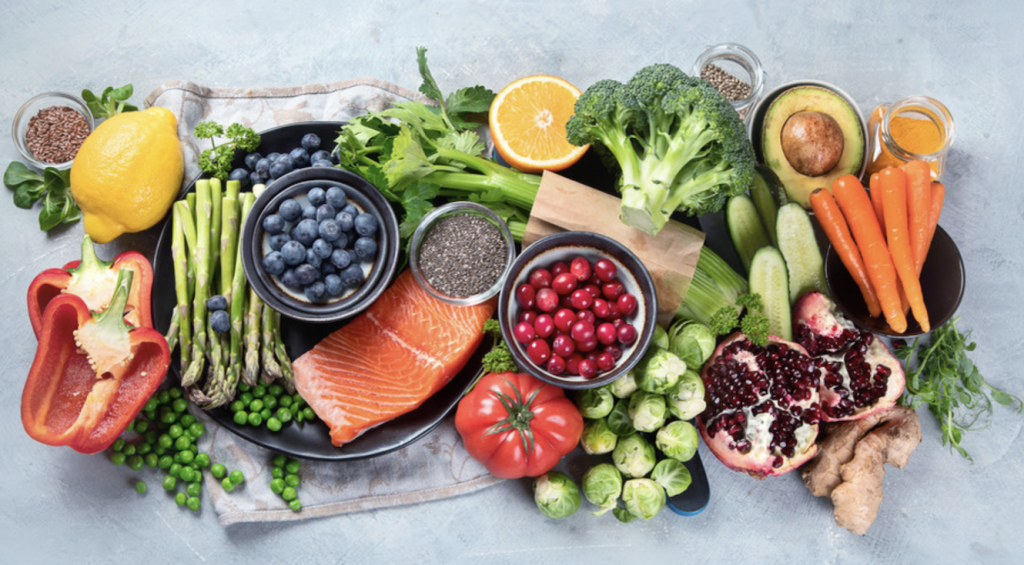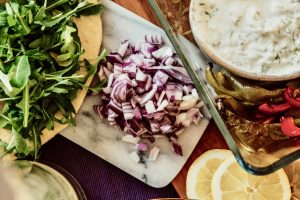Top Nutrition Tips For Healthy Ageing

By Helen West
Registered Dietitian
The optimum diet for healthy ageing should focus on nutrient-dense foods that support health and address the specific needs and challenges that can arise with age. Older people have unique nutritional needs that may differ from those of younger individuals. As we age, our metabolism tends to slow down, and our bodies may require different nutrients to support overall health and well-being.
While individual dietary requirements may vary, here are some general guidelines for a healthy ageing.
Balanced Macronutrients
Include a mix of carbohydrates, proteins, and healthy fats in your diet. Choose complex carbohydrates like whole grains, fruits, and vegetables, avoid over refined and processed foods. Opt for lean sources of protein such as poultry, lean red meats, fish, tofu, beans, and legumes or plant-based alternatives. Incorporate healthy fats from sources like nuts, seeds, avocados, and olive oil.
Protein for Muscle Health
With age, maintaining muscle mass becomes important. Adequate protein intake is crucial to support muscle health and prevent muscle loss. Older adults often eat too little protein — especially adults over 70yrs. Since most older adults are not meeting recommendations for meats, poultry, and eggs, it’s important to remind them that seafood, dairy and fortified soy alternatives, beans, peas, and lentils are great sources of protein too. These protein sources also provide additional nutrients, such as calcium, vitamin D, vitamin B12, and fibre. Protein powders which can be added to breakfast cereals, yoghurt and smoothies can also be helpful if someone is struggling to eat enough protein.
As we get older having more protein helps minimise the muscle loss associated with ageing. Protein gives the skin its elasticity, it builds and maintains tissue, cells and our muscle. It also makes hormones and produces antibodies and helps us burn calories more efficiently. As a starting point try to have 1g of protein per kilogram of body weight.

Nutrient Density
Due to changes in metabolism and potential reduced calorie needs, it’s important for older people to focus on these nutrient-dense foods. These are foods that provide a high amount of nutrients relative to their calorie content. These foods provide essential vitamins, minerals, and antioxidants, while minimising excessive calorie intake.
In addition to this, our body becomes less efficient at absorbing and using vitamins and minerals. Long-term use of prescription drugs may also reduce nutrient absorption and at the same time, our appetite may decrease. As the need for vitamins and minerals stays the same, or in some cases increases, it becomes even more important that the food we eat are healthy and nutritious.
For this reason aim to eat a balanced and varied diet, containing at least five portions of fruit and vegetables each day. For enhanced gut function the plate should look like a rainbow – bright, coloured foods are always the best choice. If cooking fresh fruit and vegetables is an issue, canned or frozen or dried vegetables and fruit can be a great alternative – they are easier to prepare, cost effective and in many cases just as nutritious.
Adequate Fibre
Consume sufficient fibre-rich foods such as whole grains, fruits, vegetables, legumes, and nuts. Fibre, aids in digestion, helps maintain bowel regularity, prevents constipation and supports heart health.
Nutrients
Vitamin B12 is important for many processes in the body, including producing red blood cells, maintaining the nervous system and releasing energy from food. As we age, our ability to absorb this vitamin becomes less effective, so maintaining an adequate intake is key. Foods that are rich sources include liver, mackerel, fortified soya milk, yogurt, most meats, salmon, cod, milk, cheese, eggs and fortified breakfast cereals.
Calcium and Vitamin D: Older adults have increased calcium requirements to support bone health and reduce the risk of osteoporosis. Good sources of calcium include dairy products, leafy green vegetables, fortified plant-based milk, canned fish and bones, fatty fish and calcium supplements if necessary. Vitamin D is also essential for calcium absorption, and it can be obtained through sunlight exposure, fortified foods, or supplements.
Vitamin D is also essential for calcium absorption, and it can be obtained through sunlight exposure, fortified foods, or supplements
Hydration
Stay hydrated by drinking plenty of water throughout the day. As people age, the sense of thirst may decrease, making it important to consciously consume an adequate amount of fluids. Water, herbal teas, and diluted fruit juices are good choices. However, it’s essential to consult with a healthcare provider if there are any fluid restrictions due to specific health conditions.
Reduced sodium intake
Older individuals may be more sensitive to the effects of sodium on blood pressure and cardiovascular issues. Therefore, it’s advisable to limit the consumption of processed and packaged foods, which are often high in sodium, and to season meals with herbs and spices instead.
Limit added sugars
Minimise your consumption of foods and beverages high in added sugars. These are not nutritional foods but have a high calorific value.

Regular Physical Activity
A healthy diet should be complemented with regular physical activity. Engage in exercises that improve cardiovascular health, strength, flexibility, and balance. Consult with a healthcare professional before starting any new exercise regimen.
It’s important to note that individual nutritional needs may vary based on underlying health conditions, medications, and personal preferences. Consulting with a registered dietitian or healthcare professional who specialises in nutrition can provide personalised advice tailored to your specific needs and goals.
ONLINE NUTRITIONIST COACHING
Learn more about Health and Wellbeing
Here are some articles and blogs about health and wellbeing



